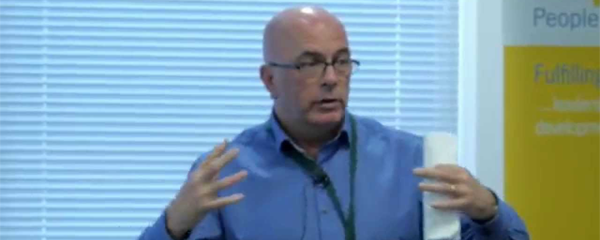About half of the comments are positive.
But there are a lot that are not, claiming that it is “bullshit” or “communism” or “absolutely hilarious” or (from an ex-chair of Deloitte) “No! More woke madness!”.
As one of my colleagues put it, “they are a bit grumpy aren’t they?”
There was a clear view that staff should know their place. Many people seemed very threatened by the idea of staff choosing a CEO salary or taking any part in taking responsibility for the company.
“Staff is staff. Management is management.”
“If I was the working owner of the company, it would be none of their business. If they do not like it… then they can leave within 5 minutes.”
“If the staff are suitably qualified to make the decision then there wouldn’t be much change. But they aren’t so this should be consigned to the same dustbin as the four-day week and Universal Basic Income (and socialism too but that’s another story).”
Enable your people to be happy and they will be more productive
Well, my view is that we should create a culture to enable people to be happy, so they can stay.
And I would say that our people are absolutely qualified to make the decision. They have full knowledge of all our finances, of what every person in the company earns and of the role I play in Happy. We give people trust and freedom to make their own decisions so that they can feel truly fulfilled.
Many said that staff are not the owners. It should be down to the shareholders. Perhaps it would be better if staff felt a sense of ownership, a sense that it is their company.
In fact, at Happy our people are effectively owners of the company as we have a share option scheme, ready for an exit to an Employee Ownership Trust.
As another person commented, “it’s the employees that make the company and do the actual work, not the CEO. A CEO without employees doesn’t have a business.”
As head of the company I, following the approach of US submarine commander David Marquet, avoid making decisions and instead leave it to those whose responsibility it is.
And instead of managers telling people what to do, we have coaches who support people to make their own decisions.
And the comments from staff in this year’s Great Place to Work award back this up:
“Happy proactively focus on the people and not just the job/work. They do believe that to have a happy workplace the people need to feel good and valued.”
“I feel empowered to do my job, I get the support I need and I feel I can be totally authentic and be myself. I never had that in previous workplaces.”
“We encourage leadership at every level — anyone can lead something.”
“The freedom to try new things without having to go through tiers of approval hierarchy. Henry, our CHO (Chief Happiness Officer) decided some years ago to stop making decisions for the company and has delegated that to… everyone else.”
The advantage of happy employees
Many of the commentators on my previous post will be scandalised by this approach, but the fact is that a happy, trusted workplace is simply more productive.
Wouldn’t they rather have a company where people feel motivated and fulfilled, than one based on command and control where managers tell people what to do?
Last year this gave us 42% growth, a substantial profit and we were in the top 2 in the UK for being a Great Place to Work (and top 15 in Europe).
If you would like to find out how to create that kind of culture, take a look at our range of leadership programmes. From Managing For the First Time to our Level 7 Senior Leadership Programme, we have a range of programmes to suit your experience level. We also offer workplace consultancy for a full review of your organisation’s culture. Contact our team for a free, no obligation chat and find out how we can help you.
Related blogs
- Let’s Get Employees to Choose the CEO’s Salary — In 2022 Henry let Happy’s employees choose his own salary increase. Here’s what happened.
- Happy: One of the World’s Most Democratic Workplaces — Henry takes us through how running an organisation with freedom and empowerment led to this award and the benefits of doing so.
- 5 Questions With Simon Grosse of Foundation SP — The CEO of one of UK’s Best Workplaces in the small business category cites empowerment and helping employees reach their goals as one of the key factors to their success.
- Is it Time to Go Beyond Empowerment? — Is empowerment alone enough? Henry talks about more that could be done to galvanise possibilities for employees.























